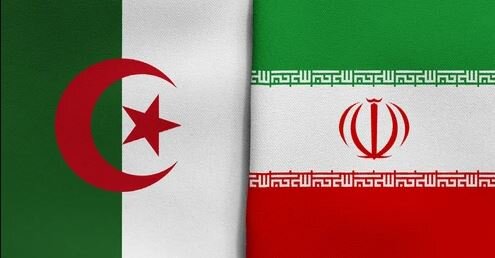A strategic rapprochement: Algeria and Iran's diplomatic alliance

MADRID – On April 8, Abbas Araqchi, Iran's Foreign Minister, arrived in the early hours at Houari Boumediene International Airport in Algiers at the head of a political delegation. This visit is part of Tehran's efforts to strengthen its diplomatic presence in key regions, with the central goal of consolidating bilateral ties with Algeria.
In the context of growing geopolitical competition, the Islamic Republic seeks to solidify its relations with strategic partners in the Maghreb, with Algeria emerging as a key ally in this endeavor.
During his visit, Araqchi met with his Algerian counterpart, Ahmed Attaf, to discuss various aspects of the bilateral relationship, as well as the main regional and international challenges. For Iran, the direct evaluation of capabilities and alliances in different geopolitical scenarios is essential for the defense and expansion of its strategic interests, and Algeria has become a crucial pillar in this regard.
The relationship between Iran and Algeria was close until the early 1990s, when Algeria played a significant role in negotiations for the release of the U.S. embassy hostages in 1981. However, tensions escalated following accusations that Iran was financing the Islamic Salvation Front (FIS), leading to the suspension of diplomatic relations between the two countries from 1993 to 2000. Nevertheless, in the following decades, ties between Tehran and Algiers were resumed, particularly in key areas such as energy and regional cooperation. This rapprochement reflects a renewed interest in strengthening the relationship between two countries that, despite past friction, share a common vision on international and regional issues.
The historical connection between the two countries, marked by decades of struggle for independence and resistance to colonialism, has been a significant factor in this process of rapprochement. Iran’s Islamic Revolution, which coincided with the early years of Chadli Bendjedid's presidency in Algeria, was met with enthusiasm in the Maghreb nation. Over the years, Algeria has played a key role as a mediator in critical moments of recent history, such as during the takeover of the U.S. embassy in Tehran and the hostage issue, demonstrating the strength of the ties between the two nations in times of international crisis.
Moreover, like the Islamic Republic of Iran, Algeria believes that the preservation of its independence can only be achieved through the strengthening of its internal sovereignty. In this context, the Maghreb countries have made continuous efforts to forge relationships with other nations that share this vision, highlighted by its membership in organizations such as the Non-Aligned Movement, the Organization of Islamic Cooperation, and the Gas Exporting Countries Forum. Similar to Iran, Algeria maintains close collaboration with Tehran within the OPEC (Organization of the Petroleum Exporting Countries), underscoring the importance of their mutual cooperation in key sectors like energy, thereby strengthening their respective positions on the international stage.
This strengthening of ties is no coincidence, as Algeria has consistently supported the Palestinian cause. Both the French colonialism in Algeria and Zionism in Palestine highlight how colonial powers have relied on stereotypes about the barbarism and primitiveness of native populations to justify oppression and occupation. Violence, in this sense, is not only presented as a tool of control but also as a "civilizing" action, serving a supposed moral superiority. In this context, both French colonialism and Zionism emerge as two sides of the same coin, where dehumanization and land dispossession are justified through distorted narratives of the reality faced by occupied peoples.
The connection between French colonialism and Zionism becomes even more evident when analyzing the tactics used to dehumanize indigenous populations. As expert Sara Rahnama points out, just as France did during its colonial era, Israel has resorted to accusations of rape to demonize its enemies. Recently, during protests calling for a ceasefire in Gaza, unsubstantiated claims emerged that Hamas had used rape as a weapon of war, a narrative Rahnama associates with a historical pattern: the idea that indigenous populations are morally and sexually inferior, which would justify both violence and land dispossession.
In this context, the geopolitical rivalry between Algeria and its neighbor Morocco becomes highly relevant. Morocco normalized relations with Israel under the so-called "Abraham Accords" in 2020, a rapprochement that has stirred tensions in the region, particularly in light of the ongoing political conflict over Western Sahara. A year ago, the Algerian government accused Morocco of sending Israeli intelligence agents, allegedly using Moroccan passports, and of acting against the stability and national security of Algeria. For the Algerian government, historically opposed to Israeli policies, Morocco's normalization of relations with Tel Aviv is seen as a betrayal of regional solidarity and a step that could further destabilize the already fragile balance in North Africa.
For Algeria, the growing Israeli influence in the region, combined with Morocco's rapprochement with Tel Aviv, represents a direct threat to Arab cohesion. This approach is also seen as an alteration of the regional order, potentially leading to long-lasting consequences for political stability in the Maghreb. In this scenario, Algeria underscores the urgent need to preserve regional unity and stability in the face of what it considers a fragmentation project driven by external powers.
Therefore, it is not surprising that Iran and Algeria, two countries with converging political visions on key aspects, seek to strengthen their relations through multiple avenues. Both nations share a common strategic approach regarding the preservation of their sovereignty, resistance to external influences, and the defense of a multipolar international order. In an increasingly polarized global context, bilateral relations between Tehran and Algiers not only respond to immediate geopolitical interests but also reflect a shared vision of resistance against power dynamics dominated by Western powers. This collaboration, founded on principles of independence and regional solidarity, highlights the growing importance of alliances between nations that, despite their cultural and geographical differences, align in their desire to reshape the regional and international balance.
Leave a Comment